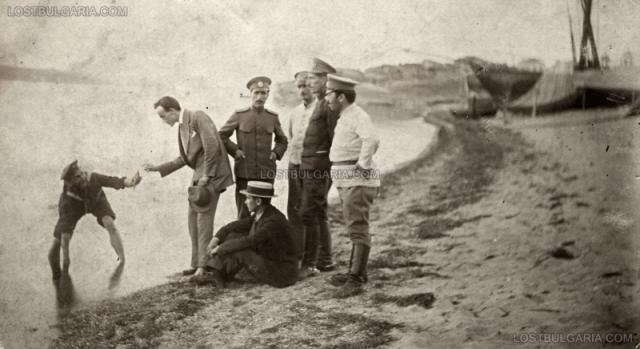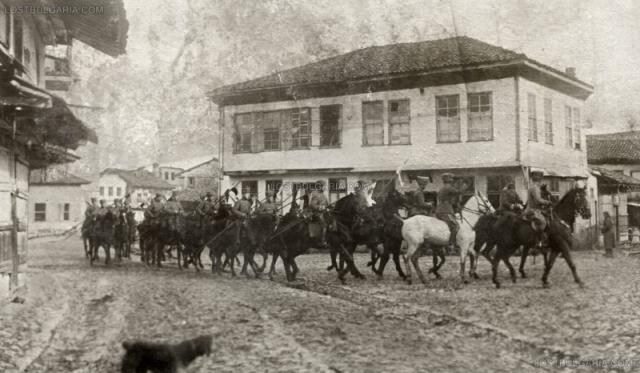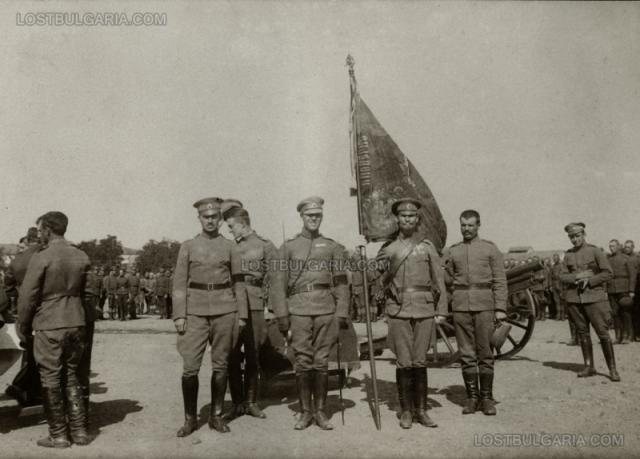The photos used are from the website of lostbulgaria.com
The war period of manoeuvre encompassed the military actions against Serbia and Romania. In 1915, the First and Second Army held the Moravian, Ovchepolska and Kosovo operations. In collaboration with the German and Austrian-Hungarian troops invading from the north, they defeated the Serbian army, seized Kosovo Pole and reached the Albanian border. At the same time, they staved off the attempts of the Allies to invade the valley of Vardar River and drove them to the border between Greece and Serbia. In August 1916, the First Army conducted Lerinska and the 2nd Army the Strouma operation, resulting in the final establishment of the Southern Front. Subsequently, the Third Army, together with its allies, fought against Romania and consequently completed the Tutrakan, Kubadin and Muntenska offensive operations by which Dobrudzha was liberated, and reached the river of Seret.
During the war period of position (1917-1918), the Bulgarian army took defensive action on the Southern Front and withstood several attempts of the Entente armies to break the front, which they finally achieved in September 1918. By creating great superiority against the poorly equipped and insufficiently armed Bulgarian Army, the opponent had a breakthrough at the front of Dobro Pole. On 29 September 1918, in Thessaloniki, Bulgaria signed an armistice with the Entente and left the war.

What was Bulgaria’s role in the international political strategy?
The German plan for taking fast military actions was caused to fail, and in 1915 the war became of positional character. Both coalitions had to seek ways to attract new countries. Located in the centre of the Balkans, Bulgaria suddenly became a country of significant importance. Bulgaria was the country on which the behaviour of Romania and Greece largely depended.
If Bulgaria had decided to join the Entente, this would have affected the Entente states’ position, which in its turn would have isolated Turkey from its allies and would have put an end to their plans for the Balkans.
Bulgaria was very important for the Central Powers and without it, Germany would have found it really hard to make its way to Constantinople, the Persian Gulf and the Suez Canal. Austria-Hungary experienced insurmountable difficulties in trying to seize Serbia and needed the help of the Bulgarian Army. Therefore, the Central Powers were more generous to Bulgaria in their promises for territorial acquisitions after the war.
What was the impact of the Bulgarian political loss in the period between the First and Second World Wars?
Between the two world wars, the Bulgarian politicians sought to find ways for Bulgaria to emerge from international isolation and become an equal partner of the other Balkan and European countries. However, they met fierce resistance on behalf of the winners trying to preserve the post-war status quo. Moreover, in Southeast Europe, unions directly targeted against Bulgaria were established.
In 1920, the newly created Kingdom of Serbs, Croats and Slovenes (called the Kingdom of Yugoslavia after 1929) and Czechoslovakia, along with Romania, signed an agreement to create the so called Little Entente. On 9 February 1934, in Athens, a Balkan agreement was signed between Greece, Turkey, Yugoslavia and Romania, which became popular as the Balkan Pact or Agreement , also known as the Balkan Entente.
They aimed at preserving the post-war system and counteracted the Bulgarian desire for a peaceful revision of the Neuilly dictate. The Bulgarian politicians were strongly supported by Germany, which also sought to reject the unjust post-war arrangements. This was a serious prerequisite for the two countries to be allies in WWII.

Did the Balkan countries manage to receive what they failed to gain back during the past two Balkan wars?
The results for the Balkan Peninsula countries depended on which coalition they were part of in the First World War. The most negative consequences were faced by Bulgaria, which was struck by a second national catastrophe. On the battlefields, 101,234 officers, non-commissioned officers and soldiers were killed, died of wounds and disease, or disappeared, and the wounded people were over 155,000.
According to the provisions of the Neuilly Treaty of 27 November 1919, Bulgaria was deprived of its land in South Dobrudzha, Western Thrace and the Western regional area. The imposed reparations amounted to 2.25 billion gold francs, and the armed forces were reduced to 30,000 people.
Neighbouring countries benefitted from the evicted Bulgarian areas. Romania again received Southern Dobrudzha, Greece took Western Thrace, which deprived Bulgaria of access to the Aegean Sea, and the Kingdom of Serbs, Croats and Slovenes received the region of Dimitrovgrad, Bosilegrad, Strumica and some villages in the area of Tran and Koula. Thus, the national question in the Balkans was further exacerbated, which was a prerequisite for new alliances and future military conflicts.

What would have Bulgarian history been like in the last 100 years if the state had been on the winning side in World War I?